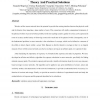59 search results - page 9 / 12 » Optimal Observation Scheduling for connected target coverage... |
WINET
2002
13 years 7 months ago
2002
Wireless ad-hoc sensor networks have the potential to provide the missing interface between the physical world and the Internet, thus impacting a large number of users. This conne...
GLOBECOM
2010
IEEE
13 years 5 months ago
2010
IEEE
Abstract--Sensors equipped with energy harvesting and cooperative communication capabilities are a viable solution to the power limitations of Wireless Sensor Networks (WSNs) assoc...
WIOPT
2011
IEEE
12 years 11 months ago
2011
IEEE
Abstract—This paper considers maximizing throughput utility in a multi-user network with partially observable Markov ON/OFF channels. Instantaneous channel states are never known...
EWSN
2009
Springer
14 years 8 months ago
2009
Springer
Abstract. In their EWSN'07 paper [1], Giusti et al. proposed a decentralized wake-up scattering algorithm for temporally spreading the intervals in which the nodes of a wirele...
INFOCOM
2008
IEEE
14 years 2 months ago
2008
IEEE
—Sleep-wake scheduling is an effective mechanism to prolong the lifetime of energy-constrained wireless sensor networks. However, it incurs an additional delay for packet deliver...

